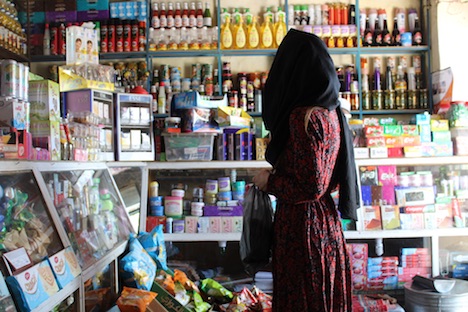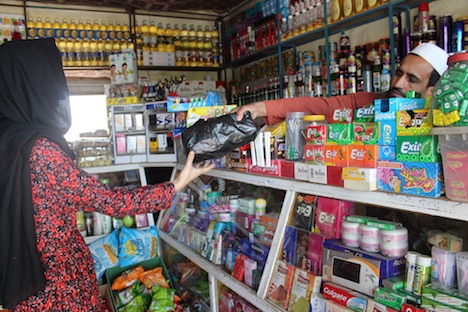Women of Afghanistan: Episode 4 - Sahar Fetrat
 Print This Print This
By Sahar Fetrat, Sahar Speaks
Huffington Post
Friday, Jul 1, 2016
Combating the Misery of Menstruation for Afghan Girls
Zahra was in third grade when her period started. At the time, she and her family were in Iran, having fled civil war in their homeland of Afghanistan. Like other Afghan refugees, Zahra and her family endured discrimination and prejudice, and were blamed for bringing illnesses into Iran. When Zahra saw the blood on her underwear, she was convinced she was sick. Could it be cancer? In Zahra’s neighborhood, Iranians associated cancer with Afghans. Would she have to drop out of school? Worse, was she dying?
Among Afghan families, menstruation is a shameful secret. It is almost never discussed, even between mother and daughter, and girls often start their menses without understanding what is happening to them. Masculinity, on the other hand, is celebrated — male circumcision is a time for family parties. “I did not have a good experience and I’ll always remember that,” said Zahra, now 30 years old. Like other women interviewed in this story, she did not want her last name publicized. “But I want all adolescent females to celebrate this transition, and enjoy it,” she said.
Fatima was 12 when her period started. The fear, shame and guilt are still raw and she struggles to describe her experiences. The older women in Fatima’s family warned her to never discuss the issue. All she needed to know was that her period was unclean, while anything related to her vagina was taboo. “I had never heard nor seen how people act when they face this,” she said. “I started hating my body, school and my girlhood, because I did not know how to hide the blood. I would clean the blood that soaked my black pants. Later, I would wash them and wear them wet.”
 |
| A university student in Kabul buys sanitary napkins. (Photo: Sahar Fetrat) |
Afghan women’s entrance into adulthood is not acknowledged, in part because female sexuality remains off-limits. Girls and teens are scared as changes occur in their bodies. They are ignorant and confused about how to cope. Unspoken expectations also haunt them. They must stop being children, and begin behaving like adults. For females, this means being submissive and acting with humility, especially towards men.
The sudden arrival of menstruation, and the humiliation it can bring, results in many Afghan girls hating the transition to womanhood. It has significant impact on their lives, especially their ability to concentrate in school. Most girls don’t have the money or support from their mothers to buy appropriate hygiene products. Sanitary pads can sometimes be found in supermarkets in major Afghan cities, but are hidden away in a section that not many can see.
A lack of awareness surrounding menstrual hygiene management has devastating consequences for Afghan girls and women. According to a joint study between the Ministry of Education and UNICEF conducted in Kabul and nearby Parwan Province, 29 percent of girls miss school due to menstruation, over 70 percent do not shower during their period and half were unaware of what it was before it started. Ignorance has led girls and women to use dirty rags that can lead to infection, and many are too ashamed to ask for medication during painful cramps. “Menstruating girls [are] unable to adequately manage their monthly menses with safety, dignity and privacy,” the report said.
 |
| In Afghanistan, 29 percent of girls miss school due to menstruation. (Photo: Sahar Fetrat) |
It wasn’t until months after starting her period that Fatima’s mother told her that girls use a cloth for blood, and wash it out at night. “I received two pieces of cloth from my mother, I was bleeding a lot and they were not enough,” she said. “I was always in stress, I hated it.” It was many more months before Fatima’s friends told her about the wonderful world of sanitary pads. While better menstrual hygiene may seem like a minor part of Afghan women’s protracted, bloody journey for better rights, Afghan girls feel it is key in their battle for equality. “It should be regarded with the same pride and celebration as circumcision is,” Fatima said.
Even in single-sex schools, Afghanistan’s national curriculum does not provide sex education, not least menstrual health hygiene. “It’s too early for Afghans to understand such issues,” said Mujib Mehradad, spokesman for the Ministry of Education, adding that there are no future plans to introduce elements that are “taboo.”
The lack of knowledge and widespread stigma surrounding menstruation is not unique to Afghanistan. Various grassroots campaigns for menstrual awareness are underway in neighboring Pakistan, where university students in Lahore recently lined their halls with sanitary napkins in protest. In India, a pair of health advocates created a popular comic book called Menstrupedia, aimed at teaching girls about hygiene during their period.
Last year, a 26-year-old London woman made global headlines when she ran the city’s marathon “free-bleeding.” Kiran Gandhi ran while menstruating and without any protection in order to raise awareness for women who do not have easy access to sanitary pads. She was subsequently attacked online and called “disgusting.”
Maryam, a literature student from Bamiyan in northern Afghanistan, believes her country needs to do more to educate its women and girls about their bodies. She recalls the onset of menstruation as the darkest experience of her life. Tall for her age with a slim build, Maryam was only 10 years old when she first got her period. When she told her mother, she was beaten. “My mother had her period when she was 13. She would not believe [me] and thought I was involved in a sexual relationship or I had been raped. She thought I had brought shame to the family. Ever since, with every period, I feel the guilt,” said Maryam, who is now 27.
“It is vital for the young women of Afghanistan to be able to concentrate in school without risking the humiliation of leaking in front of classmates, friends and family,” she said.
Source URL
|
 Print This Print This

|

